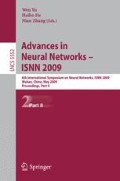Abstract
A maximum class distance support vector machine based on the recursive dimension reduction is proposed. This algorithm referring to the concept of fisher linear discriminate analysis is introduced to make the distance between the classes as long as possible along the direction of the discriminate vector, and at the same time a classification hyper-plane with the largest distance between the two classes is achieved. Thus the classification hyper-plane can effectively consist with the distribution of samples, resulting to higher classification accuracy. This paper presents the recursive dimension reduction algorithm and its details. Finally, a simulation illustrates the effectiveness of the presented algorithm.
Access this chapter
Tax calculation will be finalised at checkout
Purchases are for personal use only
Preview
Unable to display preview. Download preview PDF.
References
Jin, Z., Yang, J.Y., Tang, Z.M., Hu, Z.S.: A Theorem on the Uncorrelated Optimal Discriminant Vectors. Pattern Recogn. 34, 2041–2047 (2001)
Chakraborty, D., Pal, N.R.: A Neuro-fuzzy Scheme for Simultaneous Feature Selection and Fuzzy Rule-based Classification. IEEE Trans. Neural Networks 15, 110–123 (2004)
Cho, H.W.: Identification of Contributing Variables using Kernel-based Discriminant Modeling and Reconstruction. Expert. Sys. Appl. 33, 274–285 (2007)
Romero, E., Sopena, J.M.: Performing Feature Selection with Multilayer Perceptrons. IEEE Trans. Neural Networks 19, 431–441 (2008)
Louw, N., Steel, S.J.: Variable Selection in Kernel Fisher Discriminant Analysis by Means of Recursive Feature Elimination. Comput. Stat. Data Anal. 51, 2043–2055 (2006)
Zhang, J.H., Wang, Y.Y.: A Rough Margin based Support Vector Machine. Inf. Sci. 148, 2204–2214 (2008)
Vapnik, V.N.: The Nature of Statistical Learning Theory. Publishing House of Electronics Industry, Beijing (2004)
Bian, Z.Q., Zhang, X.G.: Pattern Recognition. Tsinghua University Press, Beijing (2000)
Tao, Q., Chu, D.J., Wang, J.: Recursive Support Vector Machines for Dimensionality Reduction. IEEE Trans. Neural Networks 19, 189–193 (2008)
Author information
Authors and Affiliations
Editor information
Editors and Affiliations
Rights and permissions
Copyright information
© 2009 Springer-Verlag Berlin Heidelberg
About this paper
Cite this paper
Sun, Z., Zhang, X., Ruan, D., Xu, G. (2009). A Maximum Class Distance Support Vector Machine-Based Algorithm for Recursive Dimension Reduction. In: Yu, W., He, H., Zhang, N. (eds) Advances in Neural Networks – ISNN 2009. ISNN 2009. Lecture Notes in Computer Science, vol 5552. Springer, Berlin, Heidelberg. https://doi.org/10.1007/978-3-642-01510-6_29
Download citation
DOI: https://doi.org/10.1007/978-3-642-01510-6_29
Publisher Name: Springer, Berlin, Heidelberg
Print ISBN: 978-3-642-01509-0
Online ISBN: 978-3-642-01510-6
eBook Packages: Computer ScienceComputer Science (R0)

